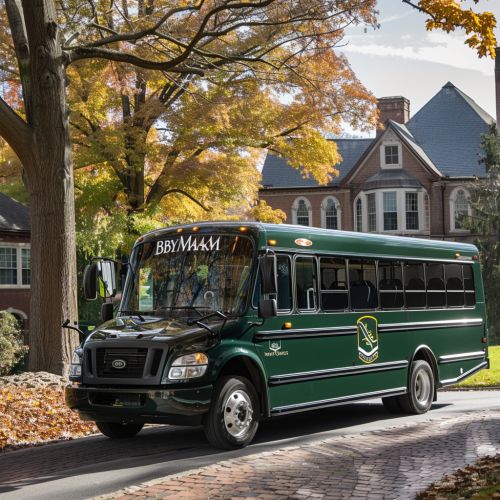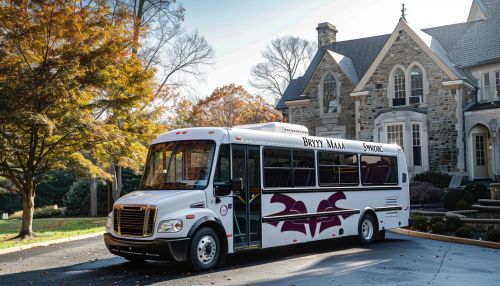Tri-College Consortium: Difference between revisions
(Created page with "== Overview == The Tri-College Consortium, also known as the Tri-Co, is a collaborative academic and social partnership between three prominent liberal arts colleges in the United States: Bryn Mawr College, Haverford College, and Swarthmore College. These institutions are located in the Philadelphia metropolitan area and share a commitment to providing a rigorous liberal arts education. The consortium allows students to cross-register for courses, participate in joint ex...") |
No edit summary |
||
| Line 20: | Line 20: | ||
To facilitate easy movement between the campuses, the consortium operates a shuttle service known as the Tri-Co Van. This service runs regularly throughout the day, allowing students to attend classes, meetings, and events at the other colleges with minimal hassle. | To facilitate easy movement between the campuses, the consortium operates a shuttle service known as the Tri-Co Van. This service runs regularly throughout the day, allowing students to attend classes, meetings, and events at the other colleges with minimal hassle. | ||
[[Image:Detail-91879.jpg|thumb|center|A shuttle bus with the logos of Bryn Mawr, Haverford, and Swarthmore Colleges parked on a college campus.|class=only_on_mobile]] | |||
[[Image:Detail-91880.jpg|thumb|center|A shuttle bus with the logos of Bryn Mawr, Haverford, and Swarthmore Colleges parked on a college campus.|class=only_on_desktop]] | |||
=== Joint Events and Organizations === | === Joint Events and Organizations === | ||
Latest revision as of 05:41, 19 June 2024
Overview
The Tri-College Consortium, also known as the Tri-Co, is a collaborative academic and social partnership between three prominent liberal arts colleges in the United States: Bryn Mawr College, Haverford College, and Swarthmore College. These institutions are located in the Philadelphia metropolitan area and share a commitment to providing a rigorous liberal arts education. The consortium allows students to cross-register for courses, participate in joint extracurricular activities, and access shared resources, thereby enriching the academic and social experiences of the students.
History
The Tri-College Consortium was formally established in 1988, although the colleges had been informally collaborating for many years prior. The origins of the consortium can be traced back to the early 20th century when Bryn Mawr and Haverford began allowing students to take courses at each other's institutions. Swarthmore joined the collaboration later, leading to the formal establishment of the consortium. The partnership was driven by the desire to expand academic offerings and foster a sense of community among the three colleges.
Academic Collaboration
One of the key features of the Tri-College Consortium is the ability for students to cross-register for courses at any of the three institutions. This arrangement significantly broadens the range of courses available to students, allowing them to take advantage of the unique strengths and specializations of each college. For example, a student at Bryn Mawr might take a course in Computer Science at Haverford or a course in Engineering at Swarthmore.
Cross-Registration
The cross-registration process is designed to be seamless. Students can enroll in courses at the other colleges without additional tuition costs, and the credits earned are fully transferable. This system encourages academic exploration and interdisciplinary study, providing students with a more diverse and comprehensive education.
The consortium also supports several joint academic programs and departments. For instance, the Tri-Co Environmental Studies program allows students to take courses across the three colleges, integrating perspectives from Biology, Chemistry, Economics, and Political Science. Similarly, the Tri-Co Linguistics Department offers a collaborative curriculum that draws on the expertise of faculty from all three institutions.
Social and Extracurricular Collaboration
Beyond academics, the Tri-College Consortium fosters a vibrant social and extracurricular environment. Students from the three colleges can participate in joint clubs, organizations, and events, enhancing their social networks and extracurricular experiences.
Tri-Co Transportation System
To facilitate easy movement between the campuses, the consortium operates a shuttle service known as the Tri-Co Van. This service runs regularly throughout the day, allowing students to attend classes, meetings, and events at the other colleges with minimal hassle.


Joint Events and Organizations
The consortium hosts a variety of joint events, including academic conferences, cultural festivals, and social gatherings. Additionally, there are several Tri-Co student organizations, such as the Tri-Co Film Festival and the Tri-Co Hackathon, which bring together students with shared interests from all three colleges.
Libraries and Resources
The libraries of Bryn Mawr, Haverford, and Swarthmore are integrated into a unified library system, providing students with access to a vast collection of books, journals, and digital resources. The Tri-Co Library Consortium facilitates resource sharing and collaborative research, enhancing the academic capabilities of each institution.
Special Collections
Each college's library houses unique special collections that are available to all Tri-Co students. For example, Bryn Mawr's library has an extensive collection of rare books and manuscripts, while Haverford's library is known for its Quaker and Special Collections. Swarthmore's library houses the Friends Historical Library and the Peace Collection, both of which are invaluable resources for research in History and Peace Studies.
Governance and Administration
The Tri-College Consortium is governed by a committee composed of representatives from each of the three colleges. This committee oversees the coordination of academic programs, resource sharing, and joint initiatives. The governance structure ensures that the interests of all three institutions are represented and that the consortium operates smoothly.
Challenges and Future Directions
While the Tri-College Consortium has been successful in many respects, it faces several challenges. Coordinating schedules and academic calendars across three institutions can be complex, and there are ongoing efforts to streamline these processes. Additionally, the consortium is continually exploring new ways to enhance collaboration and expand opportunities for students.
Technological Integration
One area of focus is the integration of technology to facilitate collaboration. The consortium is investing in digital platforms that allow for virtual cross-registration, online joint courses, and shared research projects. These technological advancements aim to further break down barriers between the colleges and create a more interconnected academic community.
Diversity and Inclusion
The Tri-College Consortium is also committed to promoting diversity and inclusion across its campuses. Joint initiatives such as the Tri-Co Summer Institute aim to support underrepresented students and foster an inclusive environment. These efforts are crucial in ensuring that all students can fully benefit from the opportunities provided by the consortium.
See Also
- Liberal Arts College
- Cross-registration
- Interdisciplinary Studies
- Academic Consortium
- Student Exchange Program
